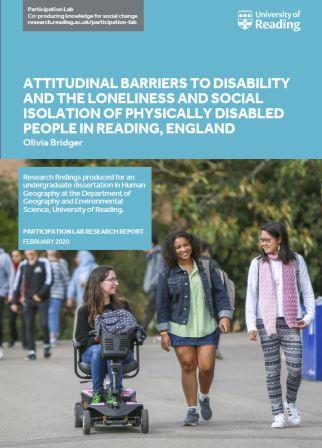We are pleased to publish a new Particpation Lab report on Attitudinal Barriers to Disability and the Loneliness and Social Isolation of Physically Disabled People in Reading, England. Guided by the principles of enabling geography, this study investigated the relationship between attitudinal barriers to disability and the loneliness and social isolation of physically disabled people, and commented on best practices for reducing attitudinal barriers. Recent Geography graduate, Olivia Bridger conducted interviews and a focus group with people with physical impairments and with practitioners who work with this group in Reading.
The study found that disabled people experience extensive attitudinal barriers in their day-to-day lives, and such barriers contribute to feelings of loneliness and experiences of social isolation because they impede on both the quantity and quality of disabled people’s social encounters; social encounters that essential for preventing loneliness and social isolation.
The research was conducted for Olivia Bridger’s undergraduate dissertation in Human Geography at the Department of Geography and Environmental Science, University of Reading. It accompanies a larger research project on tackling Loneliness and Social Isolation in Reading commissioned by the Wellbeing Team, Reading Borough Council, reported in our (2019) report, Tackling Loneliness and Social Isolation in Reading, England.

